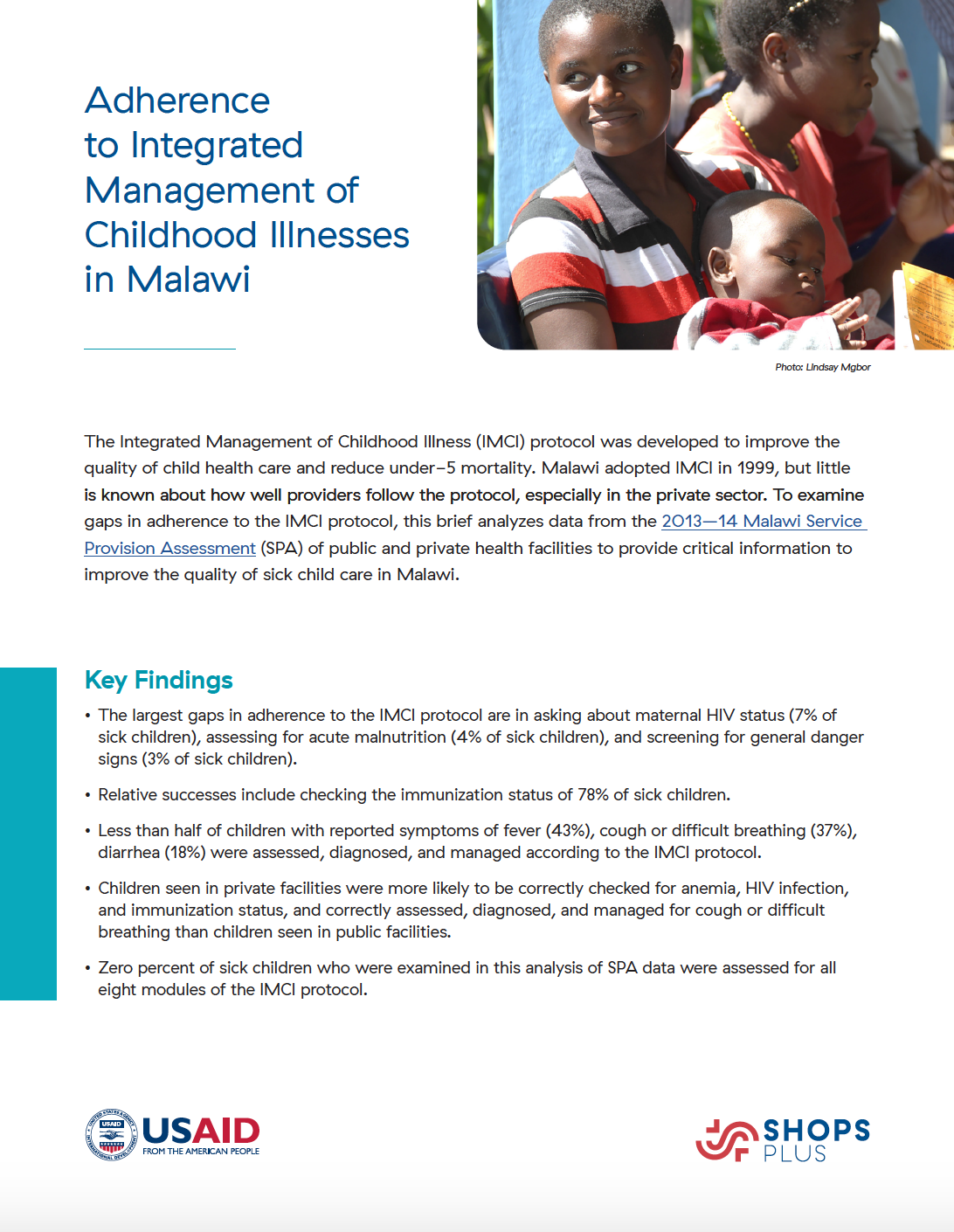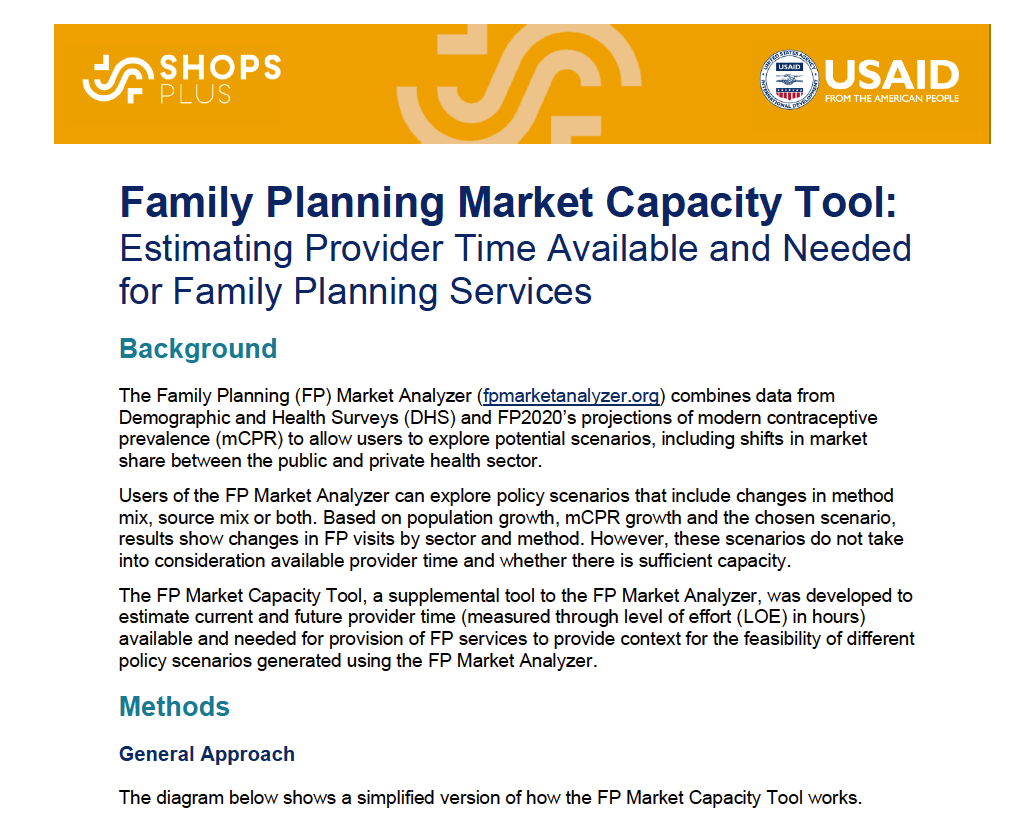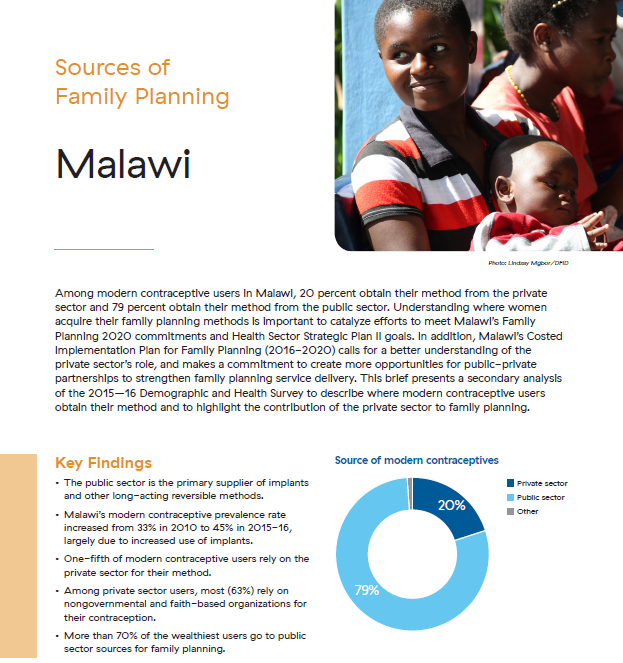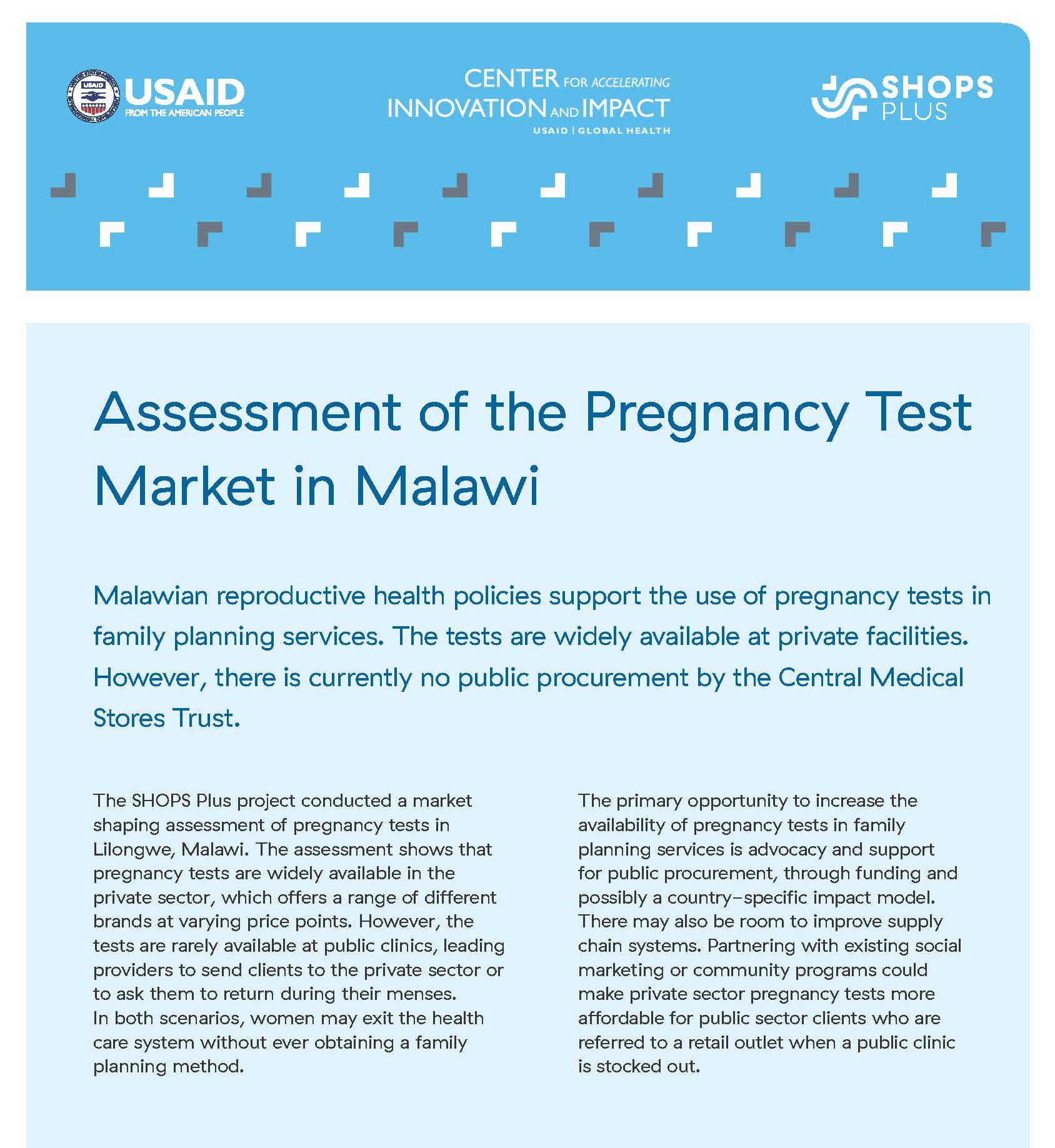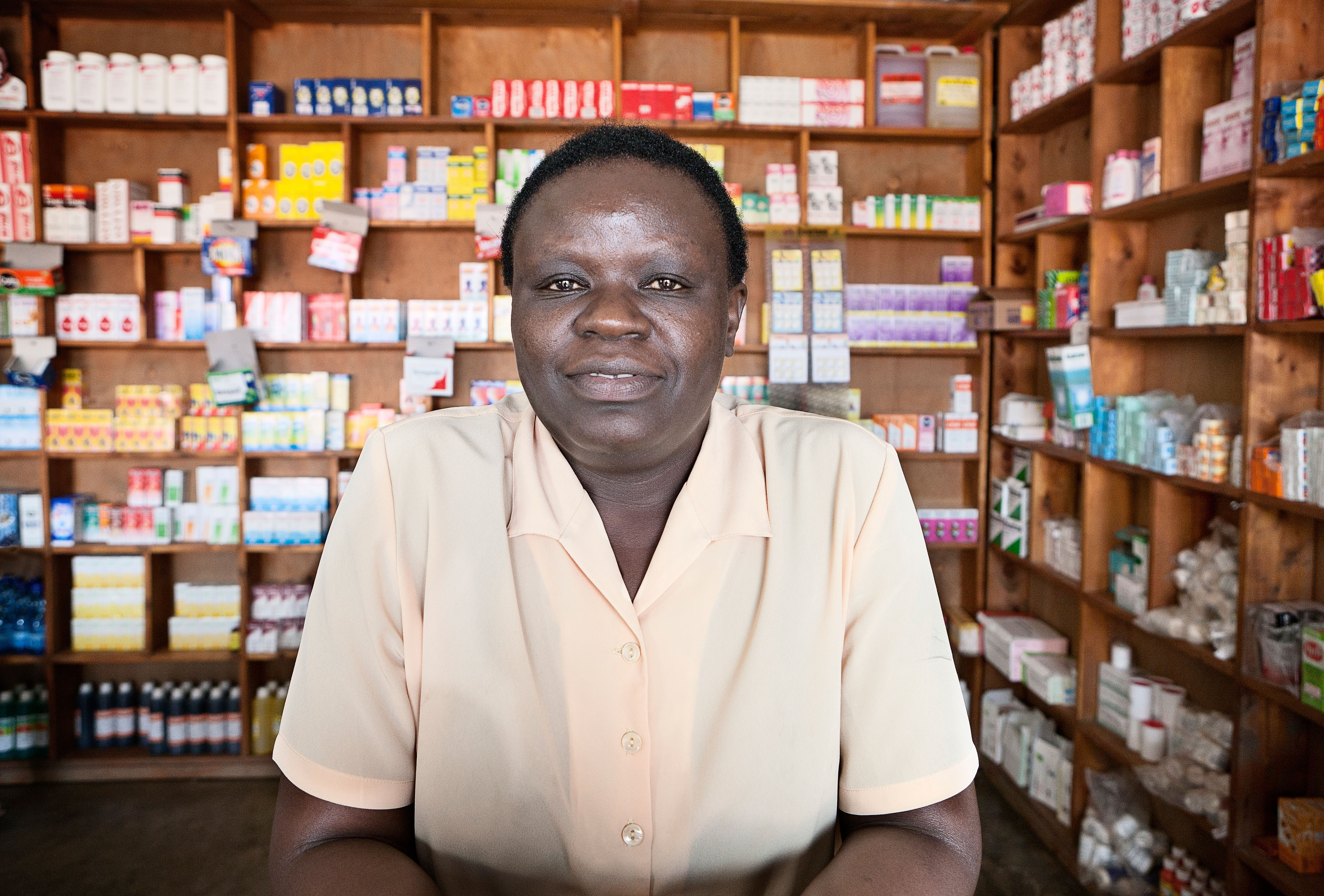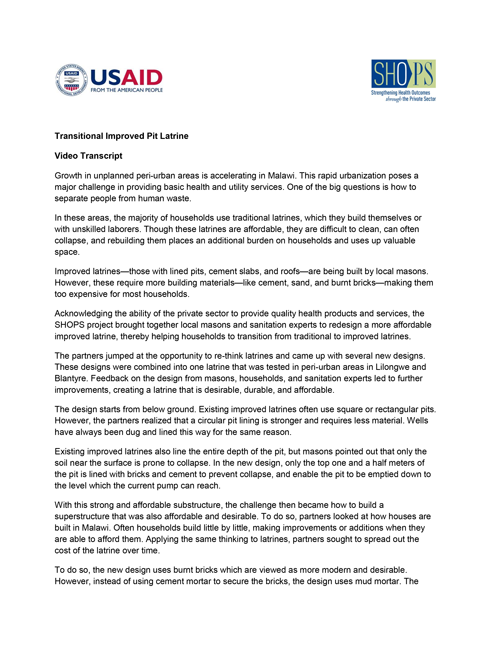
Healthy Markets CoP Session - Malawi - October 2024
The October HMCoP session focused on the family planning (FP) and sexual and reproductive health (SRH) market in Malawi. This session featured speakers from PROPEL Health, PSI Malawi, Mothers2Mothers, the MOMENTUM Tiyeni Activity, and Banja La Mtsogolo (MSI Malawi) who shared their valuable perspectives, summarized below. Alongside the presentations, valuable discussions arose on the following topics:
- Gender-related opportunities and challenges in the FP private sector
- Tailored approaches to meet adolescent needs
- Community engagement through youth-led and youth-serving organizations to expand access to FP services in urban and rural areas
- Emergency Contraceptives (ECs) and the role of the commercial sector
- Opportunities for partnerships with social marketing and behavior change actors
- Staff attrition in private health facilities, including prioritizing the involvement of the facility owners in capacity strengthening as a means of supporting staff
These discussions highlighted the importance of collaboration and synergy in strengthening FP services in Malawi, aligning with HMCoP's commitment to a supportive, community-driven environment. We extend our thanks to our PROPEL Health and Palladium colleagues for their help in planning this session, and to USAID Malawi colleagues for their participation and closing remarks. Special appreciation also goes to all participants, especially those who dedicated their time to present.
The Malawi meeting featured the following speakers:
 | John Limited, Health Financing Technical Advisor John described Malawi's FP market, focusing on contraceptive availability and use. He emphasized the private sector’s role in supporting public efforts and the Ministry’s vision for an integrated, publicly led healthcare system, including forums for private-sector engagement to advance universal health coverage. | |
Martha Valeta, Senior Program Manager Martha outlined PSI's work in Malawi, focusing on a social franchising model that partners with private clinics to offer subsidized contraceptives, demand-generation support, quality assessments, and management training. Key insights included defining the private sector’s role, understanding population segments, and aligning national public-sector efforts with private initiatives. |
| |
 | Tendai Mayani, Program Director Tendai presented Mothers2Mothers, a nonprofit employing local women with HIV as Mentor Mothers and Peer Mentors, trained to connect clients to family planning services and engage communities. Going forward, Mothers2Mothers aims to strengthen ties between health facilities, communities, and the private sector to boost FP/SRH demand. | |
Olive Mtema, Chief of Party Chief of Party Olive Mtema highlighted efforts in technical assistance, capacity building, and financial support to the Ministry of Health. The project drives demand through social behavior change (SBC) interventions, expanded outreach clinics, and youth-centered services. Key partnerships include the Family Planning Association of Malawi, the Christian Health Association of Malawi, and exploring new partnerships with private companies, like tea and sugar plantations, to invest in FP services for employees and surrounding communities. |  | |
| Charles Mhango, Clinical Quality and Training Director Banja La Mstogolo (BLM), Malawi’s largest nonprofit SRH provider and a key partner of MSI Reproductive Choices, supports the Ministry of Health through private-sector initiatives. Key efforts include developing DMPA-SC guidelines for private pharmacies, training providers, facilitating pharmacy-government MOUs, managing distribution, and offering supervisory support. | |
Bertha Migodi, Family Planning and Reproductive Health Specialist Bertha concluded by acknowledging the presenters’ contributions and the role of Malawi’s stakeholders in expanding FP services. She urged continued dialogue, saying, “where we share what we are doing, share what is working well, discuss the challenges, and explore possible solutions to expand private sector engagement in the FP space.” She thanked HMCoP organizers for sparking broader thinking on how to expand private sector engagement in Malawi. |
|
Resources
If you have resources or an upcoming event that you would like featured in the HMCoP newsletter or HMCoP website that would be of interest to HMCoP members, please contact FHM-HMCoP@fhm-engage.org.
Recent Highlights
-
Written by : FHM Engage
-
Published on : 14-Oct-24
- Highlight Type :
- Country :
- Project : FHM Engage
- Language : English

Resource Library
Adherence to Integrated Management of Childhood Illnesses in Malawi
The Integrated Management of Childhood Illness (IMCI) protocol was developed to improve the quality of child health care and reduce under-five mortality. Malawi adopted IMCI in 1999, but little is known about how well providers follow the protocol, especially in the private sector. To examine gaps in adherence to the IMCI protocol, this brief analyzes data from the 2013–2014 Malawi Service Provision Assessment of public and private health facilities to provide critical information to improve the quality of sick child care in Malawi.
Resource Type : Brief
Country : Malawi
Year : 2022-02-28T12:00:00
Language : English
Project :

Resource Library
Family Planning Market Capacity Tool: Estimating Provider Time Available and Needed for Family Planning Services
The Family Planning (FP) Market Analyzer (fpmarketanalyzer.org) combines data from Demographic and Health Surveys (DHS) and FP2020’s projections of modern contraceptive prevalence (mCPR) to allow users to explore potential scenarios, including shifts in market share between the public and private health sector. Users of the FP Market Analyzer can explore policy scenarios that include changes in method mix, source mix or both. Based on population growth, mCPR growth and the chosen scenario, results show changes in FP visits by sector and method. However, these scenarios do not take into consideration available provider time and whether there is sufficient capacity.
The Family Planning Market Capacity Tool was developed to estimate current and future provider time (measured though level of effort (LOE) in hours) needed for provision of family planning services to provide context for the feasibility of different shifts in method mix and market share between the public and private health sector. The FP Market Capacity Tool should be seen as a starting place for conversations about what the current health infrastructure looks like within a country, and how that relates to the potential feasibility of different future scale up plans. In addition, other considerations need to be taken into account beyond simply the availability of provider time, including training and quality assurance, client and provider preferences, and the affordability of services, especially within the private sector.
This tool has been pre-populated with data for 7 countries for which sufficient data on health care infrastructure in both the public and private sector could be found: Bangladesh, DRC, Haiti, Kenya, Malawi, Nepal, and Senegal.
Resource Type : Brief
Country : Bangladesh, Democratic Republic of Congo, Haiti, Kenya, Malawi, Nepal, Senegal
Year : 2021-09-28T15:00:00
Language : English
Project :

Resource Library
Sources of Family Planning: Malawi
Among modern contraceptive users in Malawi, 20 percent obtain their method from the private sector and 79 percent obtain their method from the public sector. Understanding where women acquire their family planning methods is important to catalyze efforts to meet Malawi’s Family Planning 2020 commitments and Health Sector Strategic Plan II goals. In addition, Malawi’s Costed Implementation Plan for Family Planning (2016-2020) calls for a better understanding of the private sector’s role, and makes a commitment to create more opportunities for public-private partnerships to strengthen family planning service delivery. This brief presents a secondary analysis of the 2015–16 Demographic and Health Survey to describe where modern contraceptive users obtain their method and to highlight the contribution of the private sector to family planning.
Resource Type : Brief
Country : Malawi
Year : 2018-11-14T15:07:00
Language : English
Project : SHOPS Plus

Resource Library
Sources for Sick Child Care in Malawi (Presentation)
The public sector is the dominant source of care in Malawi. Understanding if and where sick children are taken for care is critical to improve case management interventions. This presentation provides a secondary analysis of the 2015-16 Malawi Demographic and Health Survey to examine where treatment or advice is sought for sick children who experienced at least one of three treatable illnesses: fever, acute respiratory infection, or diarrhea. These illnesses represent some of the leading causes of death in children under five years old.
Resource Type : Presentation
Country : Malawi
Year : 2018-08-06T12:00:00
Language : English
Project : SHOPS Plus

Resource Library
Sources for Sick Child Care in Malawi
The public sector is the dominant source of care in Malawi. Understanding if and where sick children are taken for care is critical to improve case management interventions. This brief presents a secondary analysis of the 2015-16 Malawi Demographic and Health Survey to examine where treatment or advice is sought for sick children who experienced at least one of three treatable illnesses: fever, acute respiratory infection, or diarrhea. These illnesses represent some of the leading causes of death in children under five years old.
Resource Type : Brief
Country : Malawi
Year : 2018-08-06T12:00:00
Language : English
Project : SHOPS Plus

Resource Library
Assessment of the Pregnancy Test Market in Malawi
The SHOPS Plus project conducted a market shaping assessment of pregnancy tests in Lilongwe, Malawi. The assessment shows that pregnancy tests are widely available in the private sector, which offers a range of different brands at varying price points. However, the tests are rarely available at public clinics, leading providers to send clients to the private sector or to ask them to return during their menses. In both scenarios, women may exit the health care system without ever obtaining a family planning method.
Resource Type : Brief
Country : Malawi
Year :
Language : English
Project : SHOPS Plus

Resource Library
Availability of HIV Rapid Diagnostic Tests Over the Counter
SHOPS conducted assessments of over-the-counter availability of HIV rapid diagnostic tests through private pharmacies in Kenya, Malawi, Tanzania, and Uganda. The objective was to assess the extent to which the tests were readily accessible to and used by consumers for self-testing, in lieu of facility-based HIV testing services. The assessment revealed several findings regarding HIV rapid diagnostic tests, including their regulatory oversight, availability, source, demand, and future role.
Resource Type : Report
Country : Kenya, Malawi, Tanzania, Uganda
Year : 2016-12-01T00:00:00
Language : English
Project : SHOPS

Resource Library

Transitional Improved Pit Latrine
This video demonstrates the development and benefits of a customizable and upgradeable latrine designed by the SHOPS project in Malawi.
Resource Type : Video
Country : Malawi
Year : 2015-10-19T12:00:00
Language : English
Project : SHOPS

Resource Library
Video Transcript: Transitional Improved Pit Latrine
A transcript for the video "Transitional Improved Pit Latrine."
Resource Type : Other
Country : Malawi
Year : 2015-10-19T00:00:00
Language : English
Project : SHOPS
Pagination
- Page 1
- Next page





